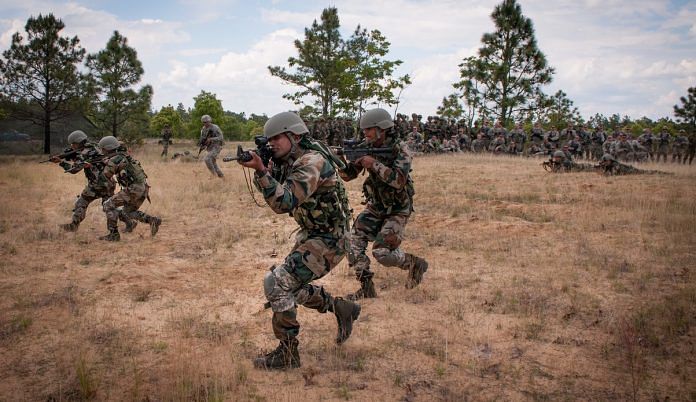According to home ministry officials, the number of incidents & casualties has dropped drastically — civilian deaths, for example, are down 96% since 2000.
New Delhi: The home ministry Monday revoked the Armed Forces Special Powers Act (AFSPA) from Meghalaya and eight police stations in Arunachal Pradesh.
Till September 2017, 40 per cent of Meghalaya and 16 outposts in Arunachal Pradesh and areas bordering Assam were under AFSPA.
According to home ministry officials, the decision was made because there has been a substantial improvement in the security situation in the northeastern states, with the year 2017 recording the lowest insurgency incidents and casualties among civilians and security forces in the last 20 years.
“While there is almost no insurgency left in Tripura and Mizoram, there has been a marked improvement in the security situation in other states of the region,” an official said.
The government also relaxed the restricted area permit and protected area permit for foreigners visiting Manipur, Mizoram and Nagaland. Restrictions, however, will remain for “countries of concern”, which include Pakistan, Afghanistan and China.
Happier numbers
Statistics show a 37 per cent decline in insurgency incidents in the northeast in 2017, compared to the previous year. A 30 per cent dip was recorded in security forces casualties, and a 23 per cent dip in civilian deaths.
From 1,963 insurgency incidents in 2000, the number fell to 308 in 2017; the civilian deaths figure has dropped from 907 to 37 in the same period – a drop of 96 per cent.
Officials say since 2014, there has been 63 per cent reduction in insurgency incidents, 83 per cent in civilian deaths, and 40 per cent in security forces casualties.
“In Assam, sustained counter-insurgency operations against the National Democratic Front of Bodoland have resulted in neutralising 63 cadres and the arrest of 1,052 cadres, besides recovery of a huge cache of arms and ammunition between December 2014 and March 2018,” an official said.
Steps for further improvement
To further improve security in the region, the government has also sanctioned 10 India Reserve Battalions in March this year — two each for Assam, Arunachal Pradesh, Manipur, Meghalaya and Tripura.
The home ministry will reimburse 75 per cent of the standard cost of raising and half the cost of infrastructure development for these new battalions.
The ministry has also enhanced aid under the surrender-cum-rehabilitation policy for militants in northeast from Rs 1 lakh to Rs 4 lakh. Incentives including a monthly stipend from Rs 3,500 to Rs 6,000 for three years, provisions for vocational training, incentive s for weapons increased from Rs 1,000 to Rs 1 lakh and compulsory Aadhaar biometric registration of those who surrender have also been introduced.
“The policy was comprehensively revised to make it more lucrative to attract more youth from the militancy into the mainstream,” an official said.
Tourist rules relaxed
The ministry also decided to relax the six-decade-old Protected Area Permit (PAP) regime from Nagaland, Mizoram and Manipur for five years with effect from 1 April, an official said.
Under the Foreigners (Protected Areas) Order, 1958, all areas falling between the inner line and the international border of some states were declared as protected areas.
The protected areas currently include the whole of Arunachal Pradesh, Manipur, Mizoram, Nagaland and Sikkim, besides parts of Himachal Pradesh, Rajasthan, Uttarakhand, and Jammu and Kashmir. Some parts of Sikkim fall under the protected area regime while others fall under the restricted area.
“A review is underway to lift the PAP from other areas too,” another official said.
With inputs from PTI



